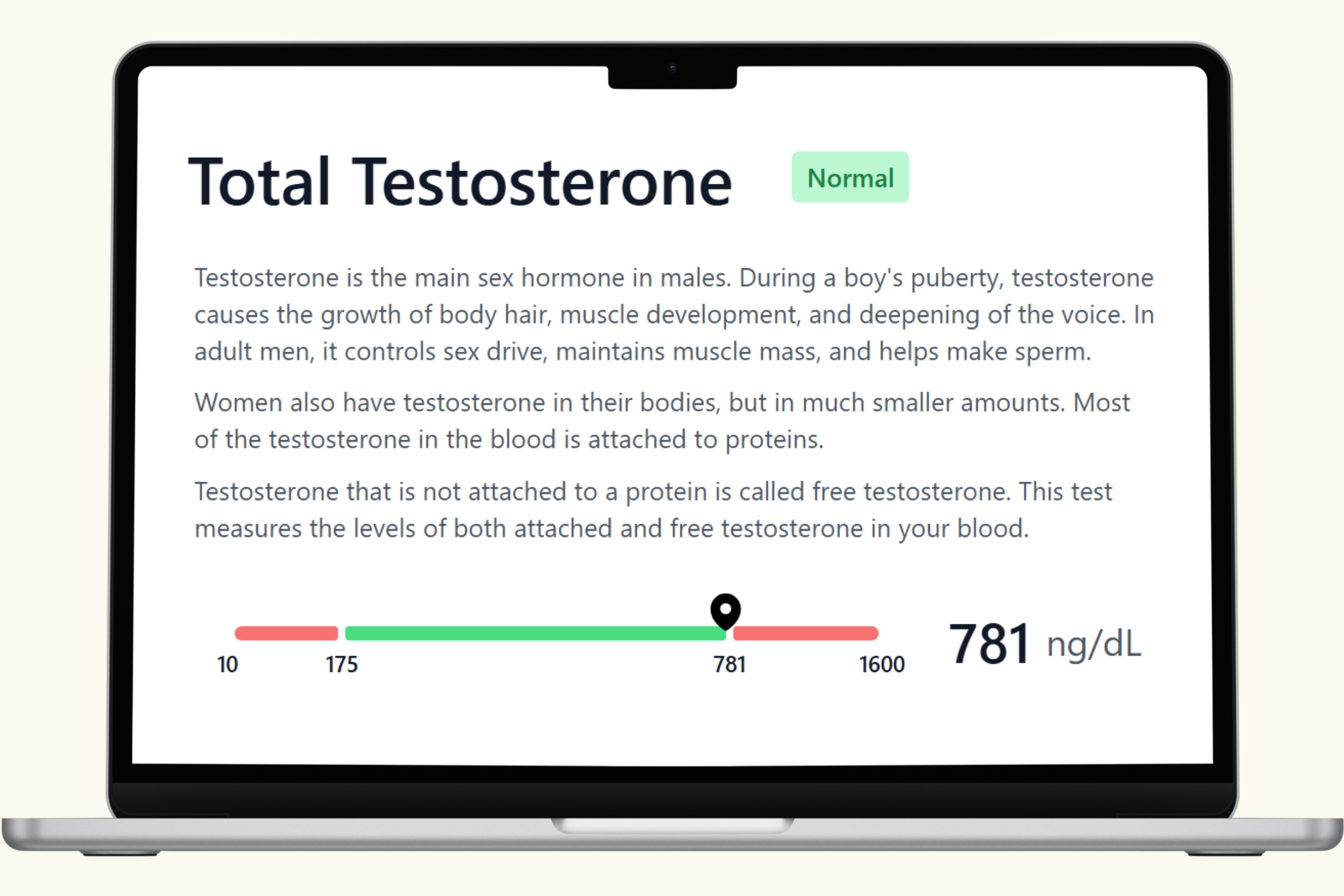Testosterone Blood Test: Understanding Total Testosterone and Men’s Health
The Testosterone Blood Test, included in the PlexusDx Men’s Hormone Blood Test, measures the total amount of testosterone in your blood. This includes both free testosterone (2–3% of total, biologically active) and testosterone bound to proteins like sex hormone-binding globulin (SHBG) and albumin. Together, these forms give a full picture of your testosterone status, which is essential for evaluating hormone balance and overall health.
Why Testosterone Matters
Testosterone is the primary male sex hormone, though women also produce smaller amounts. In men, it is mainly produced in the testes, with smaller contributions from the adrenal glands. In women, it comes from the ovaries and adrenals. Testosterone is responsible for more than just reproductive function—it plays a critical role in multiple body systems, including:
- Bone density: Supports bone strength and reduces the risk of osteoporosis.
- Muscle growth: Promotes lean muscle mass and physical strength.
- Red blood cell production: Helps stimulate red blood cell formation for oxygen delivery.
- Sexual health: Maintains libido, erectile function, and fertility.
- Mood and brain function: Supports focus, confidence, and mental clarity.
How Testosterone Changes with Age
Testosterone levels naturally rise during puberty and peak in early adulthood. After the age of 30, men experience a gradual decline in testosterone, typically about 1% per year. This decline is normal but can contribute to reduced energy, decreased strength, loss of muscle mass, and changes in sexual health. For some men, levels drop more significantly, leading to a condition known as low testosterone (hypogonadism).
Why Test for Testosterone
The Testosterone Blood Test is often ordered when men experience symptoms that suggest hormonal imbalance. These may include:
- Low sex drive or erectile dysfunction
- Difficulty building or maintaining muscle
- Unexplained fatigue or low energy
- Mood changes such as irritability or depression
- Thinning bones or fractures
- Infertility or reduced sperm production
Since total testosterone includes both free and protein-bound forms, this test provides a comprehensive measurement. However, when symptoms and total testosterone levels don’t align, additional tests—such as free testosterone or SHBG—may be ordered for further clarity.
Reference and Functional Ranges
Reference ranges can vary by lab, but typical values for adult men include:
- Standard reference range: 300 – 1,000 ng/dL
- Functional/optimal range: 500 – 800 ng/dL (varies by age and health goals)
For women, testosterone levels are much lower, typically 15 – 70 ng/dL, depending on age and health status.
Factors That Influence Testosterone Levels
Several lifestyle, health, and medical factors affect testosterone levels:
- Age: Natural decline begins after 30.
- Weight: Obesity and excess body fat can lower testosterone.
- Sleep: Poor or inadequate sleep reduces hormone production.
- Stress: High cortisol levels interfere with testosterone.
- Medications: Steroids, opioids, and some antidepressants can lower testosterone.
- Chronic illness: Conditions such as diabetes, metabolic syndrome, and liver disease can impact levels.
How the Test Works
The PlexusDx Testosterone Blood Test uses at-home dried blood spot collection with an ADX card. This easy, convenient method avoids traditional venipuncture while still delivering accurate laboratory results. After collecting your sample at home, you simply mail it to the lab, where results are processed and delivered securely online.
Optimizing Testosterone Levels
If testosterone levels are found to be out of range, several strategies may help:
- Lifestyle changes: Regular strength training, stress reduction, quality sleep, and a nutrient-rich diet support testosterone naturally.
- Weight management: Reducing excess body fat helps restore healthier hormone levels.
- Medical therapies: In cases of low testosterone, doctors may prescribe testosterone replacement therapy (TRT) after careful evaluation.
- Addressing underlying health issues: Managing thyroid, metabolic, or liver conditions often improves testosterone balance.
Key Takeaways
- The Testosterone Blood Test measures both free and protein-bound testosterone to provide a full picture of hormone health.
- Testosterone is essential for bone strength, muscle mass, energy, sexual health, and mental well-being.
- Levels peak in early adulthood and naturally decline after age 30, often impacting men’s energy and vitality.
- Testing is recommended for men with symptoms of low testosterone or when monitoring hormone therapy.
- PlexusDx offers convenient at-home dried blood spot testing with fast, reliable results.
Final Thoughts
The Testosterone Blood Test is a powerful tool for understanding men’s health and vitality. By measuring total testosterone, it provides key insights into energy levels, strength, mood, and sexual health. Whether you’re experiencing symptoms of low testosterone or simply want to monitor your hormone balance as you age, the PlexusDx Men’s Hormone Blood Test offers an accurate, convenient way to take control of your health.

Share:
SHBG Blood Test
Free Testosterone Blood Test